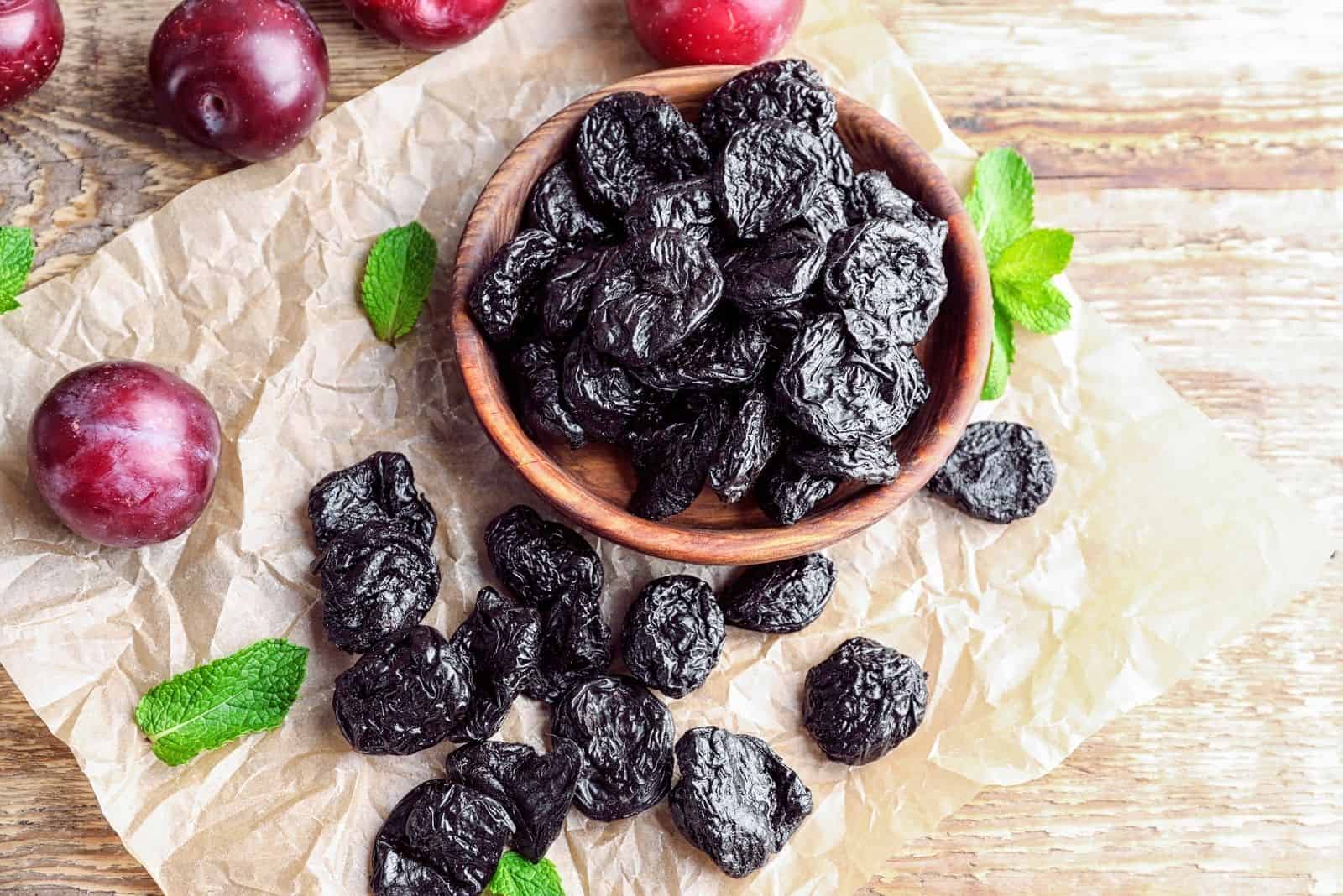Prunes are advertised as a very healthy food for humans. They are good for stomach issues, such as constipation, as well as a few more health problems.
But what about the effect they have on dogs?
Can dogs eat prunes at all?
Many foods that are perfectly safe for humans can be entirely harmful to our four-legged companions.
But what about prunes? Are prunes safe for dogs?
You can’t always ensure your gluttonous dog stays away from your plate. Still, it’s helpful to know what kind of food he can and can’t eat. If you love eating prunes, you should understand on which side of the spectrum they lie.
Prunes are nothing more than dried plums. They usually come in tins or cans, but you can find them in plastic packaging, as well.
Most of the time, they are sold without pits or stones (also known as pitted prunes), although some come with pits, as well.
On some occasions, a special kind of prunes is grown with the intent of being dried for prunes. This is because they are modified to have pits that are easy to remove.
Prunes have a high amount of sugar, and they are high in vitamin K, fiber, and potassium.
So, with everything in mind, can dogs eat prunes, or will they cause them harm? We’ll let you know in a minute.
Can Dogs Eat Prunes?

In short: no, dogs shouldn’t eat prunes.
You shouldn’t give prunes to your pooch. While they aren’t as bad for dogs as raisins and grapes, they can still be very challenging to digest.
This can upset your pup’s stomach and cause all sorts of digestive problems.
Prunes can also cause various symptoms, such as diarrhea, vomiting, inappetence, bloating, and stomach pain.
As we’ve already mentioned, prunes have high sugar content, and feeding your dog sweet food is never a good idea. Excessive sugar is harmful to dogs when eaten in high amounts.
However, this isn’t the main issue when it comes to prunes. Their pits contain cyanide, which can be highly toxic to canines and other animals.
This is why you should always keep prunes with stones away from your pets.
This type of pit can be found in many other fruits that are deemed toxic to dogs, such as cherries, apricots, and grapes.
Nutrient Content
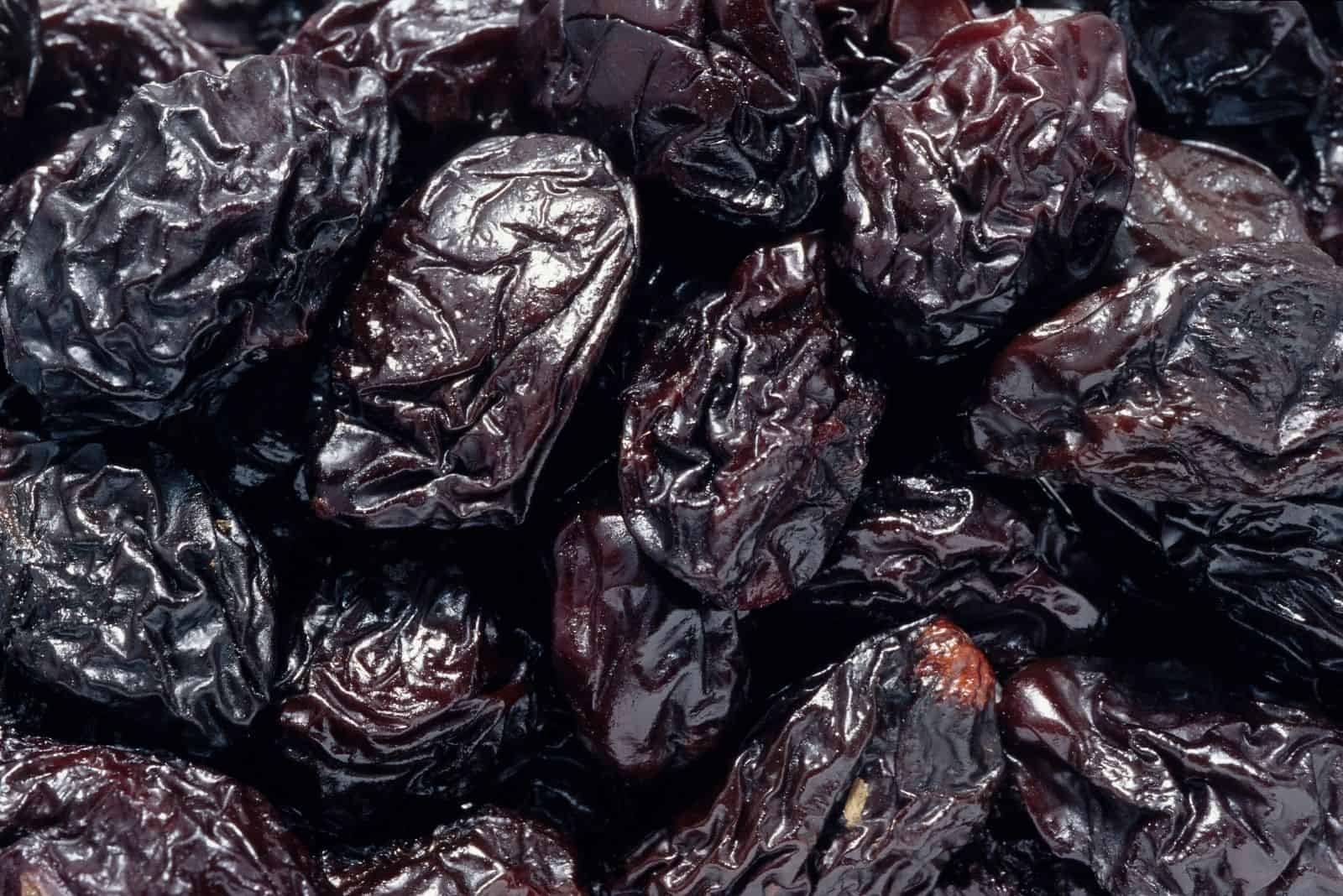
As we all probably already know, there are many nutrients in prunes. Let’s go over them in detail!
First and foremost, prunes are a good source of iron. Iron is amazing for blood deficiency, and it helps battle anemia.
It also helps with forming red blood cells, increasing the immunity and overall health of most living beings.
Another important nutrient found in prunes is fiber. An ounce of prunes contains around a gram of fiber, which is an incredible amount.
Fiber is good for healthy digestion, and it improves metabolism. It is great for battling constipation and for improving healthy bowel movements.
However, too many prunes can upset your stomach and your dog’s, leading to diarrhea and other unpleasant digestive issues.
Prunes are also high in sugar. An ounce of prunes has around 11 grams of it. While sugar can help your pup stay active and full of energy, this is way too much for such a small creature.
This amount of sugar will more likely cause damage than lead to any health benefits.
At the same time, prunes contain about 2% of the recommended daily intake of copper.
Copper is great for melanin production, keeping your pooch’s skin and fur colored and healthy. Copper is also great for collagen formation, as well as for refreshing connective tissues.
Copper is also great for calcium and iron absorption. This helps your dog fight aging, and he’ll appear younger and refreshed for a long time. It is also an important part of red blood cell creation and function.
Prunes contain around 3% of the recommended daily intake of magnesium. Magnesium is great for muscles, and it can lead to more energy and playfulness.
And if you combine it with calcium, your dog can have stronger bones, reducing the risk of arthritis and joint issues.
Funnily enough, magnesium can also help calm down a restless dog. It is a good tool for fighting anxiety and helping dogs achieve emotional stability.
Magnesium is also great for improving organ health, as it facilitates plenty of bodily functions, such as muscle contraction, relaxation, and regeneration.
Are Prunes Poisonous?

Luckily, prunes on their own aren’t poisonous to dogs. There is nothing in either the fresh fruit or dried prunes that could harm your pooch. However, you still shouldn’t be feeding prunes to your dog.
A prune’s pits, stems, and leaves contain trace amounts of cyanide. If your dog happens to eat them, he can get cyanide poisoning, which can be life-threatening. Because of this, you should keep your dog away from prunes.
There are a few more issues that come with prunes with pits. The pits are hard, sharp, and above all – undigestible.
They can scratch a dog’s gut lining, damaging it. This can cause diarrhea, blood in a dog’s poop, and overall discomfort.
If the dog is smaller, the pit is a choking hazard. It might get stuck inside its intestines, causing a gastrointestinal blockage. This is similar to when a dog eats some inedible item, such as a plastic bag or a condom. These can be fatal, especially if you don’t treat it in time.
Pitted prunes typically won’t cause issues for your pooch. If he displays any side effects, they’ll most likely be mild and last for only a couple of hours – a few days at the most.
As such, there’s no need to go to extreme measures, such as making your dog throw up.
Cyanide Poisoning In Dogs

If your pup happens to eat the part of a prune that contains cyanide, he might be in huge trouble.
Cyanide prevents cell respiration as it’s a non-competitive inhibitor for an enzyme called cytochrome c oxidase found in the mitochondria. This causes cell asphyxiation.
Cyanide won’t reduce the amount of oxygen in the cells, but it will ‘confuse’ the cells, making them forget how to use it properly.
If this condition is left untreated, it can cause respiratory collapse and, in the worst-case scenario, even death.
The most common symptoms of cyanide poisoning in dogs are:
• Agitation
• Collapse
• Convulsions
• Dilated pupils
• Foaming at the mouth
• Heavy panting
• Red gums, mouth, and tongue
• Seizures
• State of shock
• Tremors
• Respiratory collapse
If your dog has stolen some prunes off your plate, watch out for any of these symptoms – especially if he ate prunes with stones. In case you notice any of these signs, it’s of utmost importance to contact your local vet immediately.
Are There Any Health Benefits?
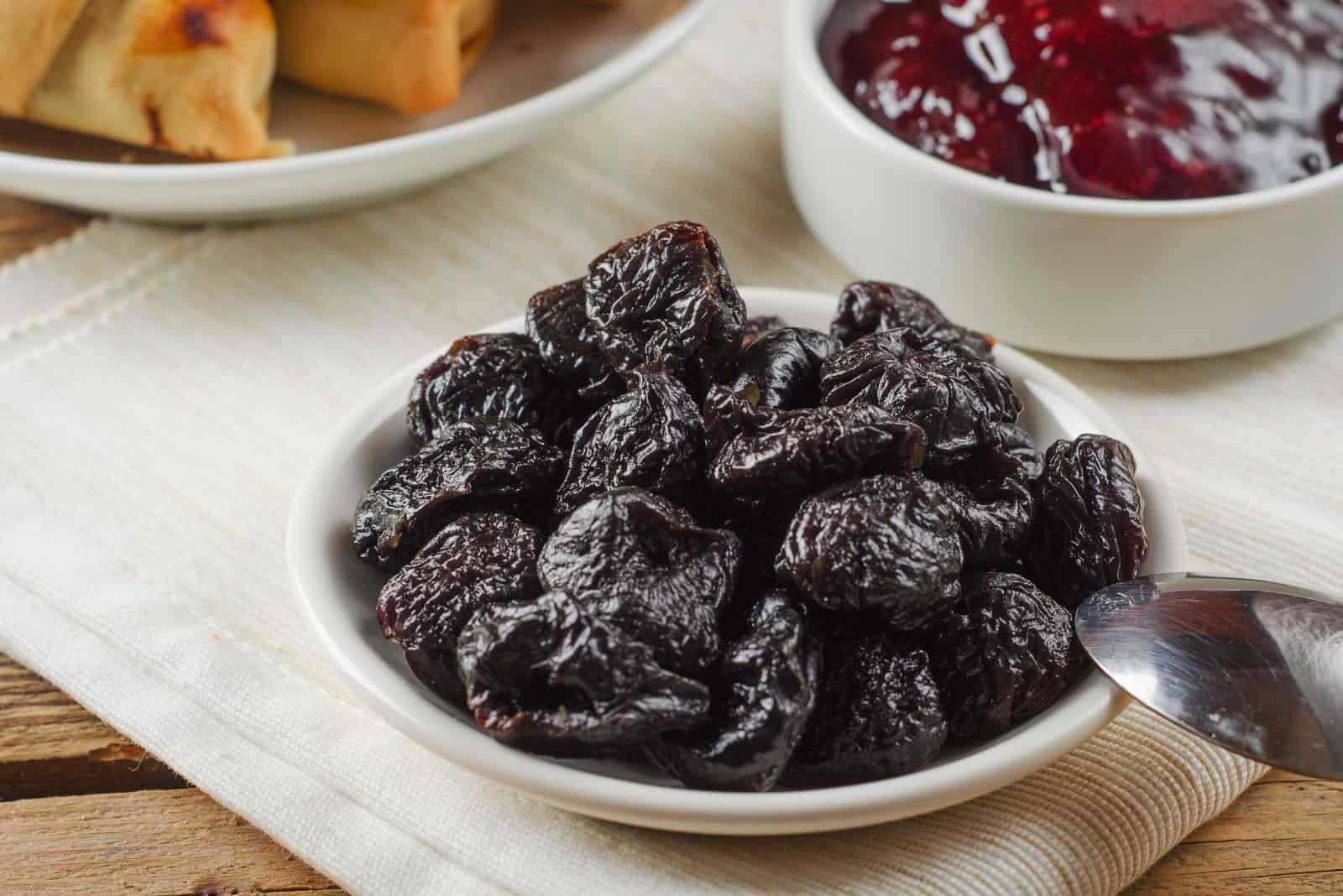
Prunes are a great human food for constipation. Many dog owners believe this is enough to make them a part of their dog’s diet. However, this isn’t the case.
If your doggy has issues with their digestive system, there are better things you can give him.
According to veterinary advice, the best option would be pumpkin, as it has a high fiber content without the added sugar. This can increase bowel movement and help your pup with his stool.
And if you’re wondering if prunes can help your constipated pooch, you should be aware that they’ll do quite the opposite.
They will more likely than not lead to further digestive problems and even make constipation worse!
What you might consider is giving your dog wet food, as this can add hydration that his body probably needs.
There are many good brands online and in local pet stores, so you won’t have to spend too much time looking for them.
Actually, there are no health benefits to feeding prunes to your pets. Dogs don’t have the same needs humans do.
For example, while it’s true that prunes are high in vitamin K and potassium, dogs don’t really need that. They get all the nutrition they need from the high-quality dog food you’re probably already feeding them.
In fact, going overboard with these minerals can cause more harm than good to your pup. While not entirely carnivorous like cats, they still don’t need added fruits in their diet. Feeding anything extra can cause an imbalance.
Of course, this doesn’t mean you shouldn’t give your dog any treats. Still, there are much healthier options than prunes, such as papaya, sweet potato, carrots, even oatmeal.
Damaging Effects Of Prunes

There are many problems your dog might face if he eats prunes, especially if he does so regularly.
Prunes contain insoluble fiber. This can lead to diarrhea in dogs. In fact, prunes are considered a natural laxative, and they lead to loose stools.
While this might seem like a good thing for a constipated dog, it really isn’t since prunes support unhealthy bowel movements.
Feeding your dog prunes can be a messy experience, not just for your doggy but for you, as well! It certainly isn’t fun having to clean up after your pup, no matter how much you love him.
Another issue is the high sugar content. It can lead to your pooch gaining weight, and if you continue to do so, it will make him overweight or even obese.
This is not just unhealthy, but it will make your dog lazy and less playful. This can end in serious behavioral issues, as well.
Prunes can give your pup flatulence and cause bloating. Sure, you might not see this immediately, but if you smell nasty dog gas, you’ll know what just happened!
Another unwanted side effect is the possibility of your dog becoming laxative dependent.
Laxative dependence means your dog has a hard time passing stools without some kind of laxatives.
A healthy stool might even be impossible for him until there is a laxative in his system! This can happen if your pup has too much food with laxatives, such as prunes.
Not just that, but the high amount of iron in prunes can give your dog dark-colored or even black stools.
While not dangerous on its own, this might prevent you from noticing any blood in his poop, which might lead to you not seeing an underlying health condition.
Because of all of this, it would be best if you don’t risk it. Don’t give your dog prunes, no matter how healthy they might seem.
Are Prunes Damaging In Small Amounts?
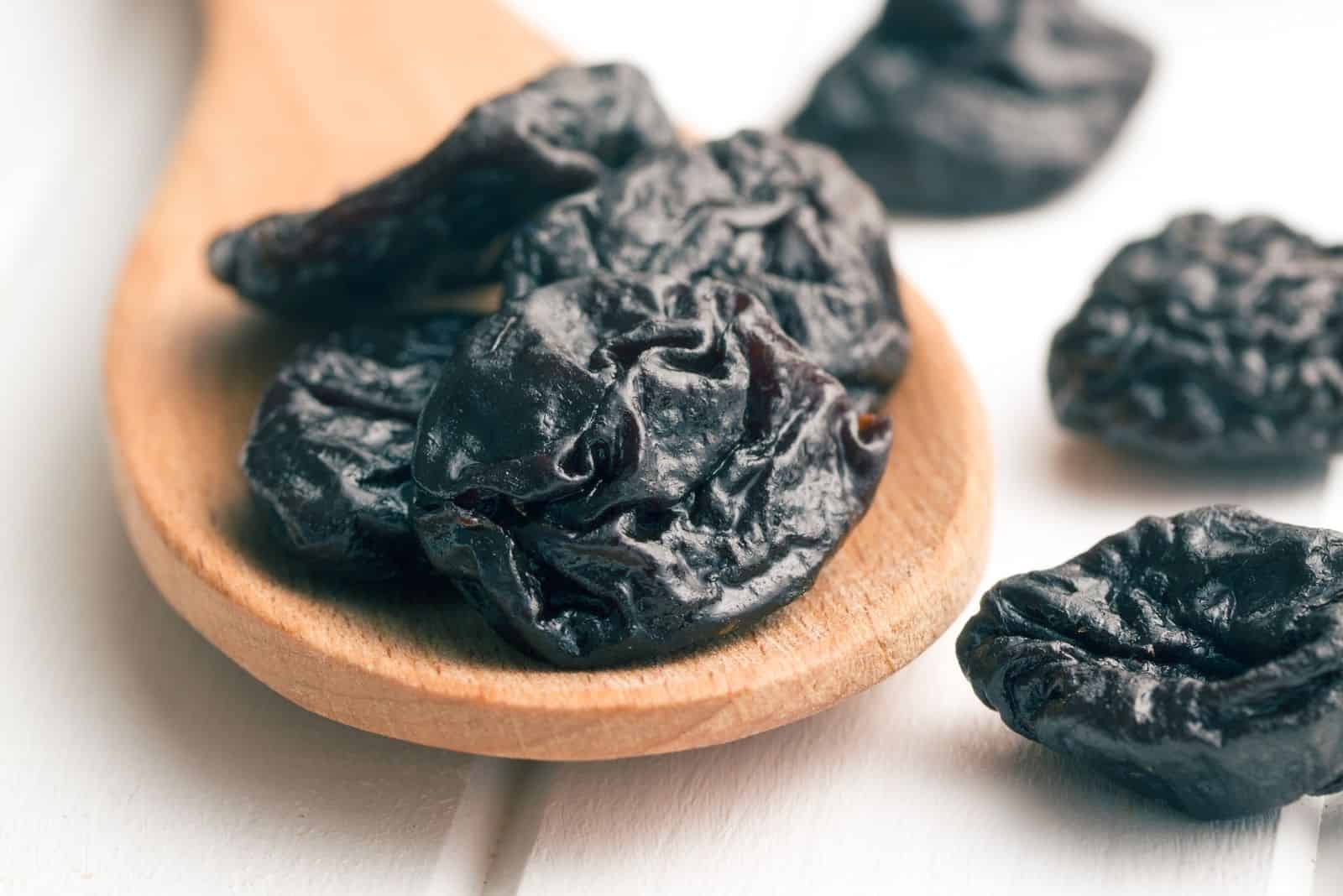
Some people argue whether it’s dangerous to feed prunes to your dogs in small amounts.
As mentioned above, prunes aren’t toxic to dogs. Despite their high sugar content, they aren’t toxic to dogs and won’t cause immediate harm.
This has led to some dog owners considering giving prunes to their pups in small amounts.
While it isn’t proven, some people believe that giving a small amount of prunes can help their dog’s colon’s health due to their high fiber content.
Also, prunes are full of iron, which is deemed good for dogs with anemia as it helps form red blood cells.
Still, there are more healthy foods you can give to your dog than prunes. We would not suggest you feed prunes to your pooch in any amount.
Can Dogs Eat Fresh Plums?
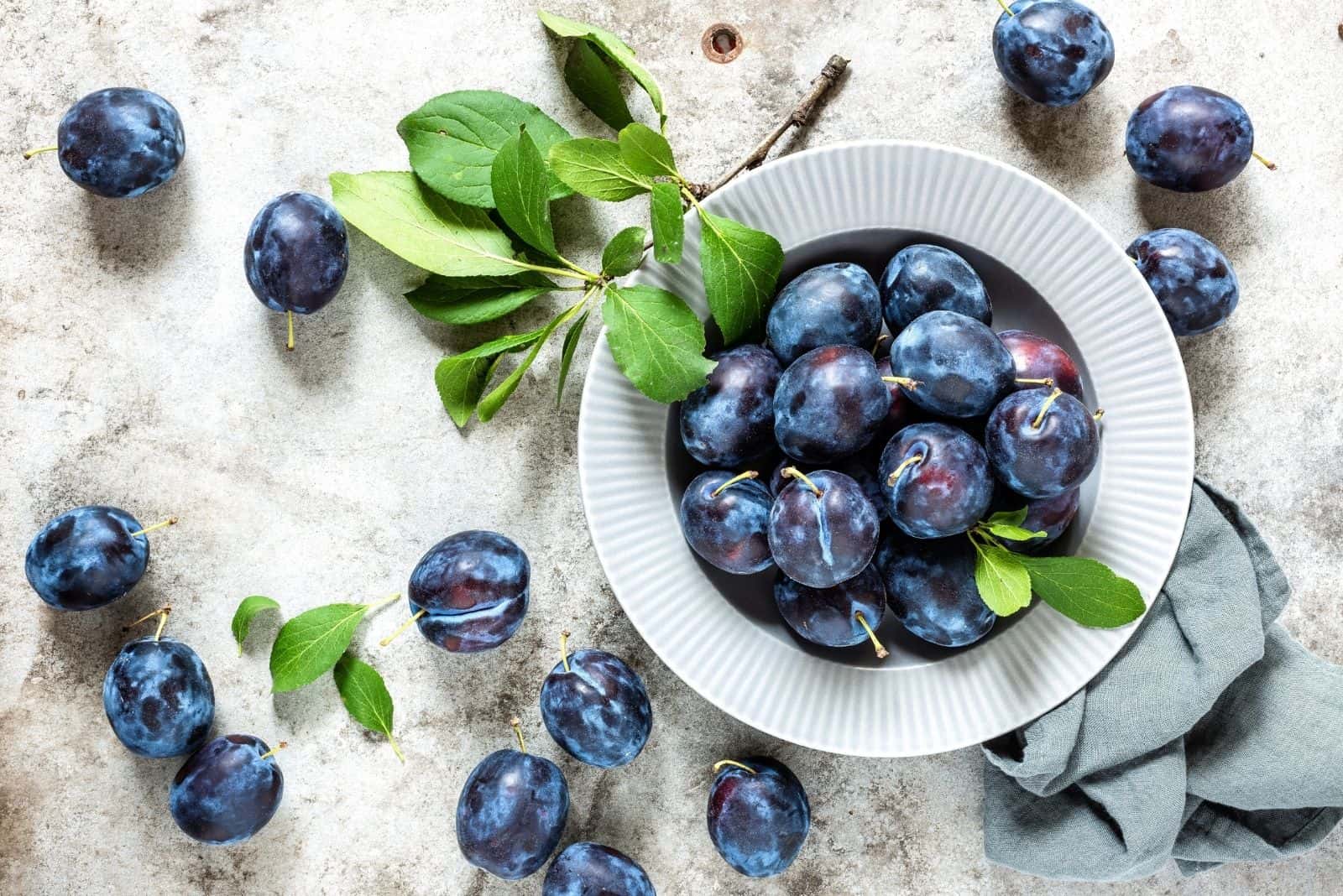
You might think that plums and prunes are the same – in the end, prunes are made from plums. However, as we’ve already mentioned, it takes a special type of plum to make prunes.
These plums are easier to dry out and have pits that are much easier to take out. At the same time, they contain much more fiber than regular plums.
Because of this, prunes are considered a great food for constipation.
Fresh fruit is in many ways different than feeding your dog dried prunes. Dried fruits have a much more concentrated flavor, and the fiber and its effects are more pronounced.
With fresh fruit, this isn’t the case. Because of this, plums are not as dangerous for your pups as prunes are.
In fact, the biggest danger comes from plum pits, as well. Other than that, plums should be okay for your pooch.
However, plums, just like prunes, have high sugar content. This means they aren’t good for your dog in large amounts.
What About Prune Juice?
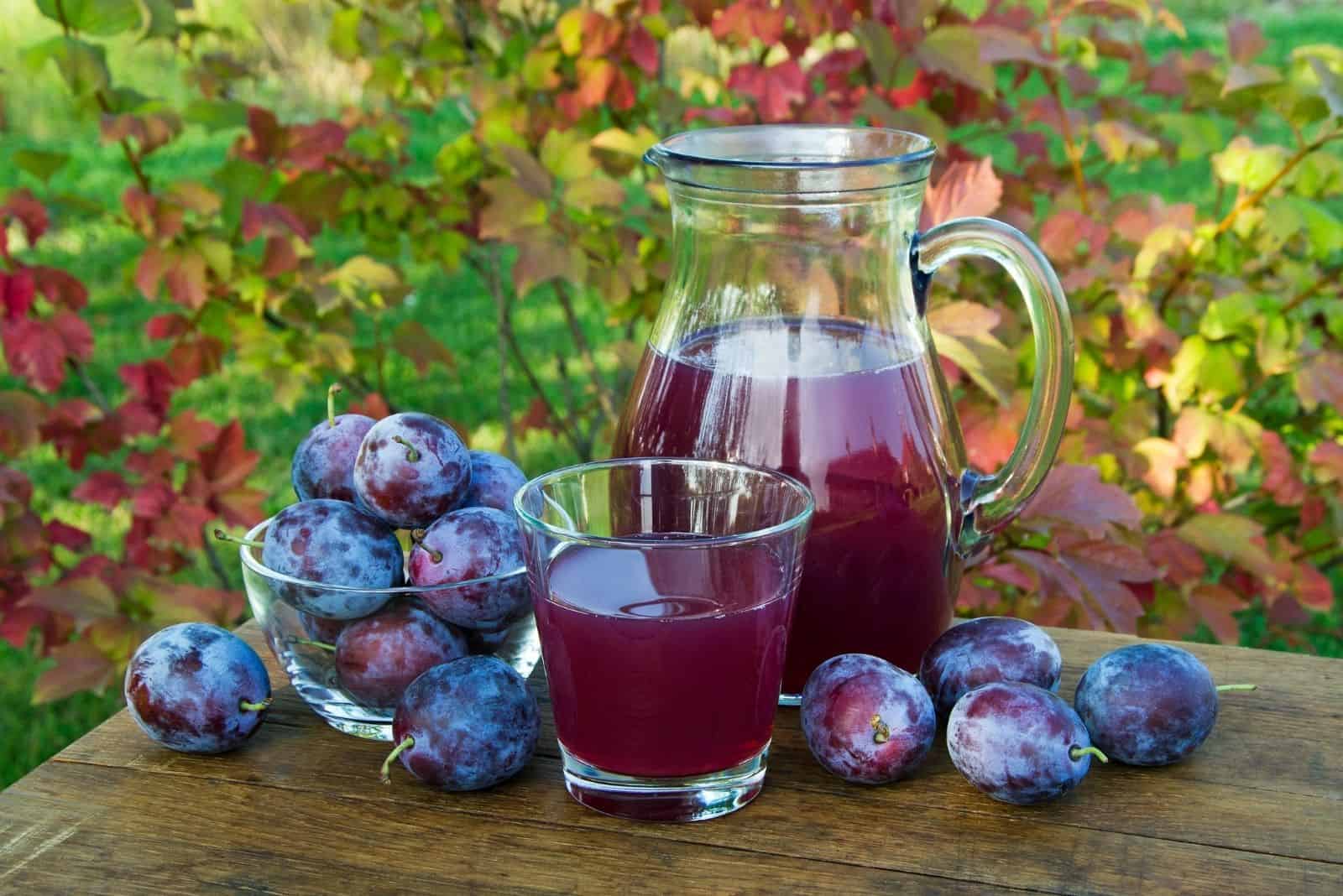
Prune juice is also not the best for your four-legged companion.
Just like any other plum product, it contains high levels of sugar, which isn’t good for dogs. Even diet prune juices still contain too much sugar than is good for your dog.
In fact, pouring any liquid other than water in your pup’s water bowl will dehydrate your beloved companion.
Even with high fiber content, this can lead to further constipation, which will only harm your dog and cause issues for your dog’s digestive system.
While dog lovers might assume prune juice can help their pups, this isn’t the case. In fact, it would only increase his stomach upset.
What Are Alternatives To Prunes?

We all love to give treats to our best friends, especially when we want to reward them for good behavior.
Traditional dog treats from Amazon are not the healthiest options, so you might want to substitute them for some veggies or fruits.
However, prunes are not an adequate substitute for a dog treat due to the reasons mentioned above. Instead, you might try watermelon, which is tasty without too much sugar or other harmful nutrients.
Oranges are another fruit you might want to give your pup, but make sure you’re only giving them a small amount.
They contain citric acid, which can burn a dog’s stomach if consumed in large amounts.
Pumpkins are also a healthy substitution for prunes. They might even help with constipation in dogs, as they are high in fiber but low in sugar and fats.
Some other fruits and vegetables that are safe for dogs are:
- Apples
- Bananas
- Blueberries
- Broccoli
- Brussels sprouts
- Cauliflower
- Fig newton
- Green beans
- Guava
- Papaya
- Paprika
- Pears
- Peppers
- Pineapples
- Strawberries
How Much Is Too Much?

Photo from: @zoe_zoumzoumdog
As you probably can conclude by now, feeding too many prunes to your pup can have many downsides. Sure, there are a few benefits to eating prunes, but they can cause harm if eaten in excessive amounts.
So, how can you know how much is too much?
While it isn’t possible to give the exact amount when you’re going overboard, it would be wise not to give prunes to your dog on purpose. It’s very easy to give him too much, and there really aren’t that many benefits.
If you’re someone who loves eating prunes, make sure to leave them out of your pup’s reach – especially if they still have pits inside! While prunes themselves won’t damage your dog instantly, pits are a whole different story.
In case you think your pooch could benefit from eating prunes, contact your vet beforehand. It’s important to let your veterinarian know if you plan on making any changes to your pup’s diet. They will let you know whether or not it’s safe.
And if your dog eats a few prunes off your plate while you’re not watching, don’t panic. Monitor him for a day or two just to make sure he didn’t eat too much and that his stomach hasn’t become upset.
However, prunes are not toxic or dangerous to dogs, so it isn’t a problem if they take a bite or two.
Read Next: Kindfull Dog Food Review: A Closer Look At Affordable Pet Food

